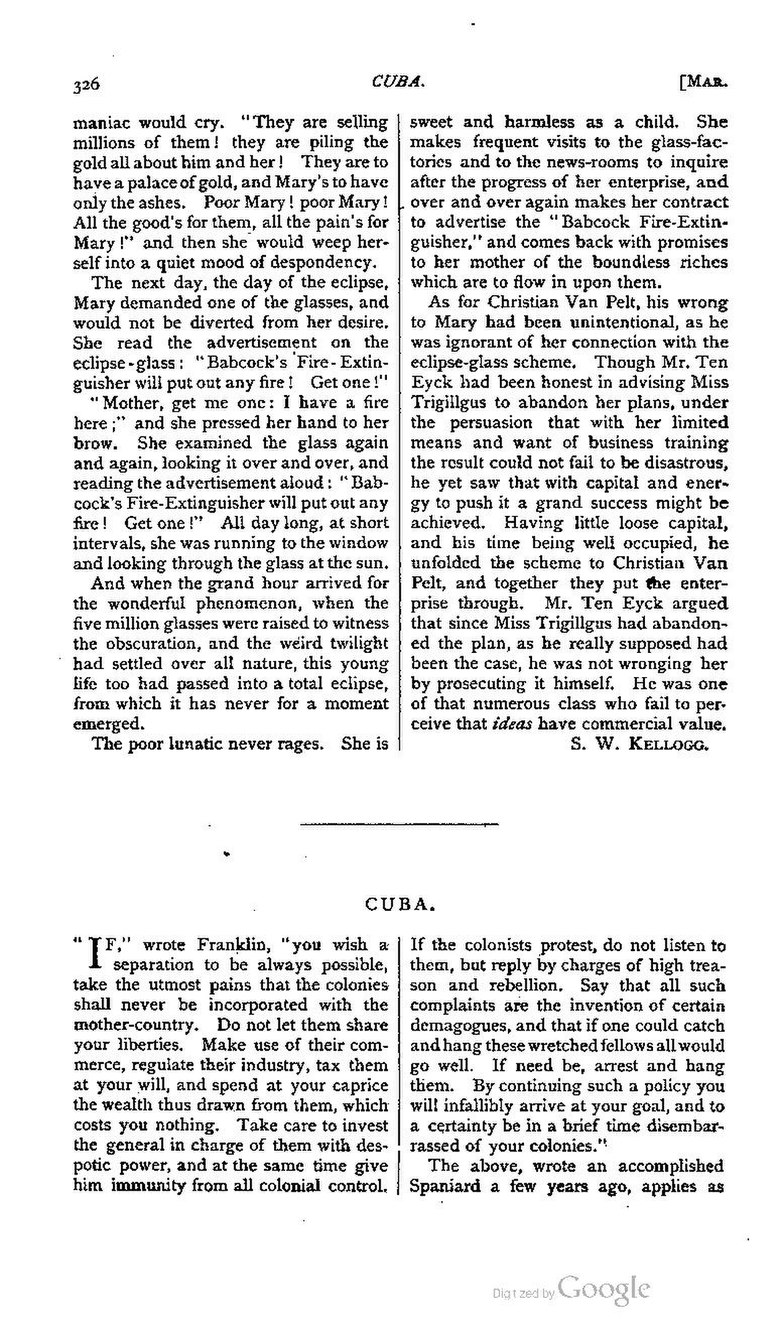maniac would cry. "They are selling millions of them! they are piling the gold all about him and her! They are to have a palace of gold, and Mary's to have only the ashes. Poor Mary! poor Mary! All the good's for them, all the pain's for Mary!" and then she would weep herself into a quiet mood of despondency.
The next day, the day of the eclipse, Mary demanded one of the glasses, and would not be diverted from her desire. She read the advertisement on the eclipse-glass: "Babcock's Fire-Extinguisher will put out any fire! Get one!"
"Mother, get me one: I have a fire here;" and she pressed her hand to her brow. She examined the glass again and again, looking it over and over, and reading the advertisement aloud: "Babcock's Fire-Extinguisher will put out any fire! Get one!" All daylong, at short intervals, she was running to the window and looking through the glass at the sun.
And when the grand hour arrived for the wonderful phenomenon, when the five million glasses were raised to witness the obscuration, and the weird twilight had settled over all nature, this young life too had passed into a total eclipse, from which it has never for a moment emerged.
The poor lunatic never rages. She is sweet and harmless as a child. She makes frequent visits to the glass-factories and to the news-rooms to inquire after the progress of her enterprise, and over and over again makes her contract to advertise the "Babcock Fire-Extinguisher," and comes back with promises to her mother of the boundless riches which are to flow in upon them.
As for Christian Van Pelt, his wrong to Mary had been unintentional, as he was ignorant of her connection with the eclipse-glass scheme. Though Mr. Ten Eyck had been honest in advising Miss Trigillgus to abandon her plans, under the persuasion that with her limited means and want of business training the result could not fail to be disastrous, he yet saw that with capital and energy to push it a grand success might be achieved. Having little loose capital, and his time being well occupied, he unfolded the scheme to Christian Van Pelt, and together they put the enterprise through. Mr. Ten Eyck argued that since Miss Trigillgus had abandoned the plan, as he really supposed had been the case, he was not wronging her by prosecuting it himself. He was one of that numerous class who fail to perceive that ideas have commercial value.
CUBA.
"IF," wrote Franklin, "you wish a separation to be always possible, take the utmost pains that the colonies shall never be incorporated with the mother-country. Do not let them share your liberties. Make use of their commerce, regulate their industry, tax them at your will, and spend at your caprice the wealth thus drawn from them, which costs you nothing. Take care to invest the general in charge of them with despotic power, and at the same time give him immunity from all colonial control. If the colonists protest, do not listen to them, but reply by charges of high treason and rebellion. Say that all such complaints are the invention of certain demagogues, and that if one could catch and hang these wretched fellows all would go well. If need be, arrest and hang them. By continuing such a policy you will infallibly arrive at your goal, and to a certainty be in a brief time disembarrassed of your colonies."
The above, wrote an accomplished Spaniard a few years ago, applies as
